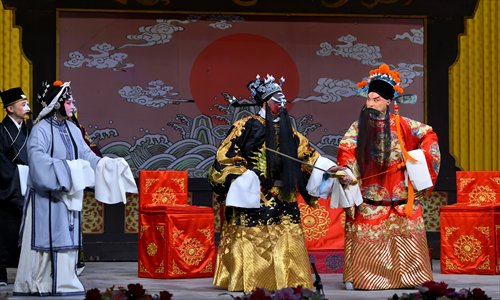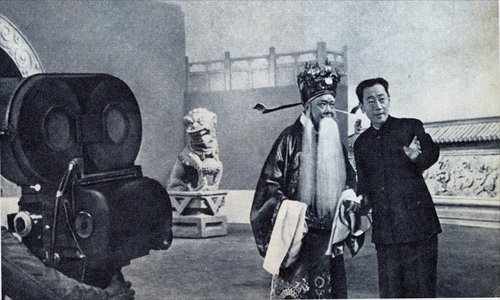Legend of the dragon
Shanghai celebrates the 120th
Mei Lanfang (1894-1961) and Zhou Xinfang (1895-1975) were two of the most important practitioners of Peking Opera in the 20th century. Mei was famous for playing female roles (dan) and Zhou was well-known for playing elderly male roles (laosheng).

This year sees the 120th anniversary of Zhou's birth. Zhou started performing in Shanghai in the 1930s and remained based in the city until his death. Shanghai will be holding a series of commemorative activities as a tribute to the late master.
The events include a series of performances and seminars, and also the release of a new documentary about Zhou made by Shanghai Media Group.
Just as Mei Lanfang founded the Mei style of performance, so Zhou founded his Qi style.
According to Shan Yuejin, the director of Shanghai Peking Opera Company, as well as keeping to the traditional Peking Opera formula, Zhou's Qi style absorbed different elements from many other stage arts, like modern theater, cinema and dance. It also emphasized the artistic aspect of Peking Opera as a theater art.
Zhou was also the first Peking Opera actor to adopt the "director" method from Western theater, thus systemizing Peking Opera as a fluent art form.
Qi style
A native of Ningbo, Zhejiang Province, Zhou first performed on the stage at 7 years old, and took on his first leading role in his Shanghai debut when he was 13.
Although Zhou was not a naturally gifted singer, he developed a voice that was loud and broad, husky but not hoarse, with vigorous bass notes.

Zhou Xinfang (right) with an actor during filming Photos: Courtesy of Shanghai Peking Opera Company
Zhou performed and directed over 600 plays. Among them, Qin Xianglian and Xiao He Chases Han Xin Under the Moonlight are the most representative of his work and are still popular today.
The titular main character of Qin Xianglian is a woman during the Song Dynasty (960-1279). She is suing her husband, Chen Shimei, who has married a princess following his marriage to Qin, because he refuses to recognize Qin as his first wife. With the help of a prime minister, Wang Yanling, Qin wins the case and the story ends with the execution of Chen.
In most versions of this play's performances, the actor who plays the role of the prime minister usually leaves the stage before Chen is executed.
However, Zhou added a new scene in which the prime minister angrily chastises Chen for his despicable behavior before he exits.
In Shan's opinion, Zhou's performance added a more personal touch to the role and portrayed a prime minister who truly cared about people.
The story of Xiao He Chases Han Xin Under the Moonlight was taken from one of the four great classical Chinese novels, Romance of the Three Kingdoms. It tells the story of Xiao He, a statesman, and his attempts to track down Han Xin, a talented general. Both once served Liu Bang (the founder of the Han Dynasty (206BC-AD220).
Zhang Xinzhong, a Peking Opera performer in Shanghai who started learning under Zhou in the 1950s, told the Global Times that for this play, Zhou usually played the role of Xiao He. He also came up with a novel performance method for the other role, Han Xin.
The play involves a set of stylized Peking Opera movements to indicate when the actors are riding horse. Zhou added an extra "looking back" movement for Han Xin to indicate that Han didn't really want to leave his old life behind.
"He (Zhou) is not just singing, but acting the character. He is not just speaking the lines, but telling a story," Zhang said.
Crossover and inherit
Zhou's openness saw him participate in many other forms of performing arts, which he also influenced with his Qi style.
During the 1920s and the 1930s, Zhou was a member of the Southern China Theater Company, one of the first theater companies to put on modern Chinese plays. During this period, he also starred in a silent film about Peking Opera.
Chen Shaoyun, a 68-year-old Qi-style Peking Opera actor in the Shanghai Peking Opera Company, said it is hard to follow in Zhou's footsteps because of the sheer quantity and quality of the plays in which he performed. At present, only three actors in his company follow the Qi style - a sharp decline since Zhou's time.
Chen said that performers trying to learn from Zhou need to do more than imitate his singing style and movements. Rather, they should learn Zhou's spirit of assiduous study and understanding of story and character.